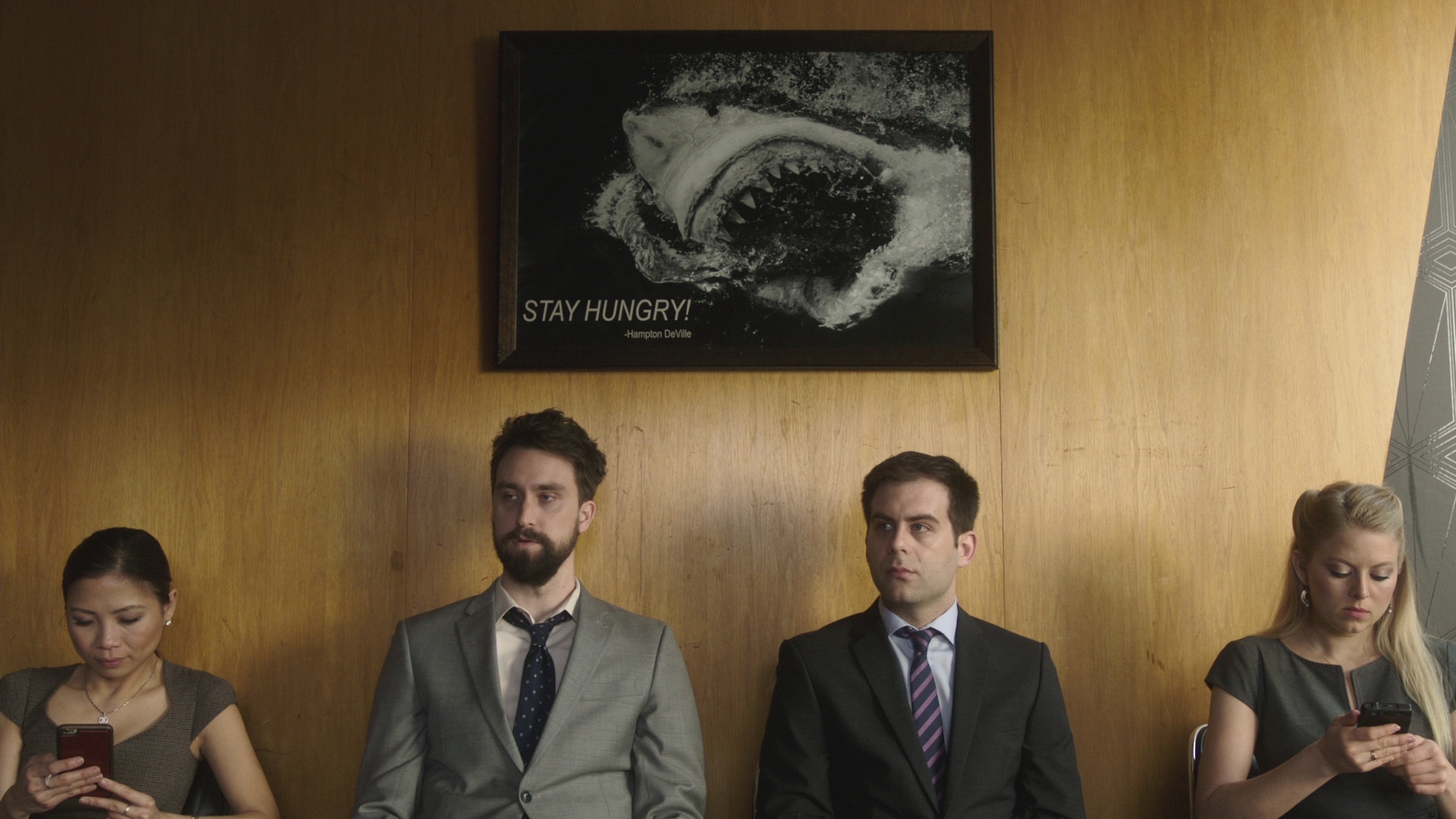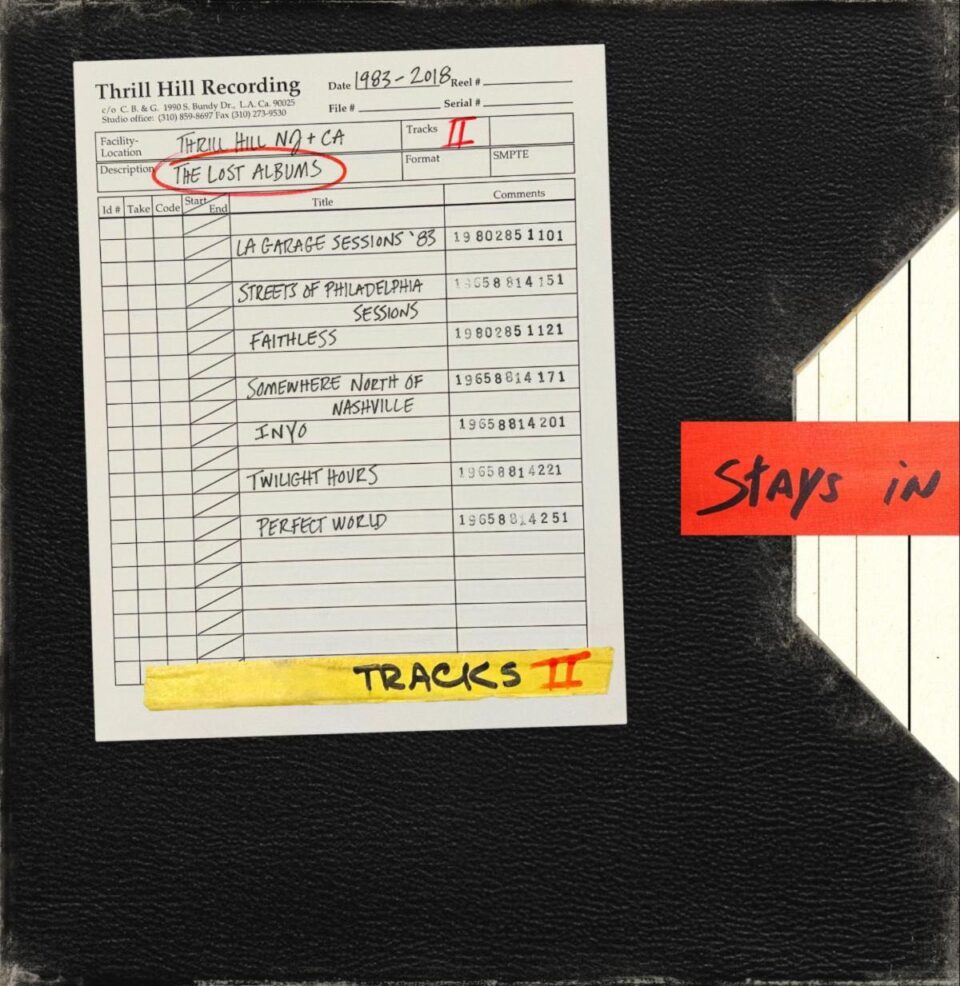“Comedy Central Is Corporate.”
Advertising is a one-sided conversation, but in a city where you’re captive to your car, billboards are the raving lunatics populating the streets. They scream the same slogans at you every time you drive past, until they mysteriously disappear overnight, replaced by new psychotics.
Yet consider the white text against black, the period presenting this sentence as a statement, not a scream. Accompanied only by a date—“1/17/18”—this billboard feels less like some kind of commentary and more like the plain presentation of a legal disclaimer, a shrug to get ahead of an accusation. It’s a wise way for Comedy Central to promote its greatest scripted show since Broad City’s first season, especially because the ad’s muted self-awareness matches the lively-yet-downbeat intelligence of its co-stars and co-creators.
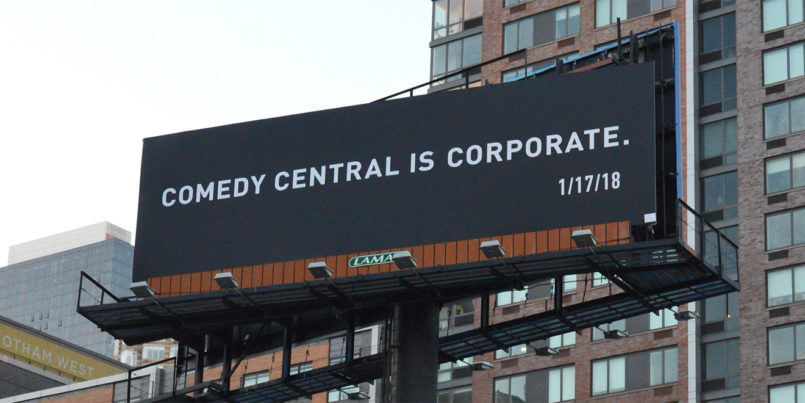 “Complaining about your job is human nature, to some extent,” Matt Ingebretson declares, “unless you’re very enlightened, or just a better person than I am.”
“Complaining about your job is human nature, to some extent,” Matt Ingebretson declares, “unless you’re very enlightened, or just a better person than I am.”
“Or if you’re just lucky enough to have serotonin,” interjects Jake Weisman, grinning. Jake and Matt have been writing, working, and otherwise just “hanging out every day” for years, which explains why they can finish each others’ sentences as effortlessly as any other era’s comedy partners. But as a twenty-first century team-up, their shared language is fluent exhaustion—imagine if Abbott and Costello met existential monsters like insomnia or self-doubt instead of the Universal Monsters like Frankenstein and the Wolf Man.
They’re quick to clarify, however, that as co-creators of their new series Corporate, premiering January 17 on Comedy Central, this duo is, in fact, a triumvirate. Their friend and collaborator Pat Bishop, who wrote for the season alongside them and also directed every episode, has a background in editing comedy for cult audiences, including The Birthday Boys and W/ Bob and David. These three crossed paths night after night in dimly-lit venues, black box theaters, and barebones clubs, honing their stand-up as traffic whizzed by outside. Humor was a lot of things for these three: an outlet, a workshop, a coping mechanism, and—yes—a sales floor.
Matt, raised in rural Texas, and Jake, raised in New York, came into LA’s stand-up scene as side-hustles on the way toward larger entertainment dreams. “It’s funny that the entertainment industry is in California, because it just feels like an ongoing gold rush,” Jake says. “I initially came out here to work in film. And comedy became the vessel, and I fell in love with it.” When Matt moved west, meanwhile, he was pursuing dreams of writing for The Tonight Show with Conan O’Brien. (That brief tenure, you’ll recall, proved to be a particularly painful cautionary tale about corporations stomping out creative sparks.)
Their writing and filmmaking ambitions wound up syncing well with LA’s stand-up scene circa 2010, when YouTube’s steady rise shifted expectations and put aspiring comedians on the clock, around the clock. “In 2010, being a comedian meant not just doing stand-up,” Jake elaborates. “Assistants at agencies passed videos around, and that’s how people got discovered. So there was a community that was hanging out, but also being productive. You had to be an entrepreneur.”
While Jake manifested his filmmaking urges by creating videos with the consistently-self-mockingly-named sketch group Women, Matt became his roommate. “He’s an uncle to my cats,” Jake proudly offers.
“So our meeting story is unfortunately very boring,” he shrugs. “We met each other, liked each other, had a common sensibility toward comedy and life, and then started making shit. We became blindly obsessed with making shit for a while.”
“In a way that makes me less of a fully dimensional human than I should be to maintain friendships or relationships, but that’s what it was,” adds Jake. All streams of consciousness lead inevitably to a dam of self-deprecation.
These currents of critical thought converge at Mixed Company, one of countless local eateries in Silver Lake that strive to stick out from the Sunset Boulevard competition. (Mixed Company abruptly closed a month after this interview.) Matt and Jake are here to discuss their new show, set in an inescapable labyrinth of life, a world both internally and externally dominated and dehumanized by business. They speak into a Sony voice recorder, its logo boldly positioned above the timecode, and an iPhone SE for a back-up recording, the device now an antique by the standards of Apple devotees. There’s Topo Chico on the table (the name you trust in mineral water) alongside Boulevard Tank 7 Farmhouse Ale, selected because the brand recalls nostalgic hometown associations with growing up in Missouri. Behind us, our server clocks in and begins her night shift.
***
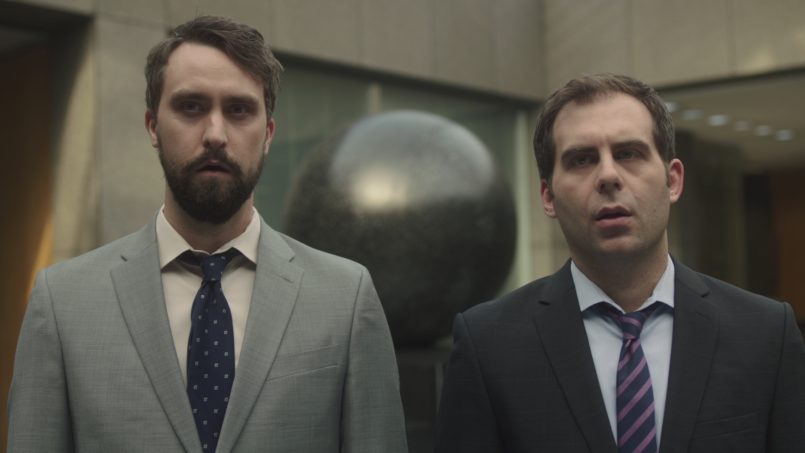
Matt Ingebretson and Jake Weisman
It’s a question they’ll be asked many times by the hopeful (or the bitter): how do relative unknowns come seemingly out of nowhere and land an entire season of a show on Comedy Central, a network credited for making tastes and careers in comedy for decades?
“The boring answer is we were A+ students,” Matt says. Or model employees, if you will.
After years of obsessively producing web videos, Matt and Jake had an extensive body of work to show as a proof-of-concept. “Maybe you have the ability, but that can only be seen through tons of hard work,” Jake states. So they entered their pitch meeting with an angle often advised for any job interview: Don’t show how badly you want the job. “Part of our thing was saying, ‘We want to break your mold and do something different,” Matt says. “Comedy Central is good about giving new creators chances. Nathan for You, Broad City. So we went in saying, ‘We don’t want to do anything like what you’ve done before.’”
“They want to know you’re not going to waste their money so they don’t lose their job,” Jake says plainly. “So if you make their lives a little bit easier, they’ll be good to you.”
“Part of what we’ve seen,” Matt continues, “is that networks are desperate for someone to come along with an idea they can get excited about. So there’s a sense of relief when they are brought something fully realized.”
“It’s kind of like Fight Club if the guys never started a Fight Club. Because who’s going to start a Fight Club? No! I don’t wanna get hit in the face! I just wanna complain!” — Jake Weisman
And so, Corporate arrives without compromise, a stunningly stark and hilariously dark comedy that eschews the situational for the existential and swaps laugh tracks for anxiety attacks. For years, sunny talking-head sitcoms like The Office and Parks and Recreation made office work—even government work—look life-affirming; these workplace comedies posit that personalities flourish on the job, life lessons are learned, and everyone within arms’ reach falls in love and gets married. If these shows are the antidote for nine-to-five blues, Corporate is the cyanide pill—a poisoned flask concealed in the bottom desk drawer.
To put it differently, “It’s kind of like Fight Club if the guys never started a Fight Club,” Jake offers. “Because who’s going to start a Fight Club? No! I don’t wanna get hit in the face! I just wanna complain!”
“We were thinking about offices and jobs and how they’re often portrayed as these wonderlands where everyone is goofy and having fun,” says Jake. “It sucks to work in an office. Even great jobs are horrible. People with the best jobs hate their jobs.”
“So it gives us a chance to talk about, one: existentialism,” Matt says, “and ask, ‘What are any of us doing with any of this?’ We’ve accepted all of this as normal. But…it’s just this bizarre thing that we’ve constructed. And two: that we’re living in a dystopian future right now. This show is exciting to us because it’s a platform to talk about the nightmare we’re living in right now, run by corporations.” I check the levels on my Sony voice recorder as he elaborates; I don’t want to miss any of this.
Corporate takes place almost entirely within the fluorescent lights and shadowy confines of Hampton Deville, a world-dominating behemoth of a corporation that manufactures and provides everything from bananas to automatic rifles. Within this world exists an entire ecosystem of predators and prey…and sucker-fish scavenging for leftover bagels and scraps of approval—namely two Junior-Executives-in-Training, Matt (Ingebretson) and Jake (Weisman). The diabolical twist in this satire’s conception; there is no life outside their jobs, no dreams of something else. When we meet Matt and Jake, they’ve already given up on their hopes and have resigned to simply grabbing whatever opportunities for power cross their cluttered desks. Successes in Corporate are weighed on a scale that slides away from humanity, whether it’s Matt confidently volunteering to build a “PowerPoint of Death” to sell Hampton Deville’s weapons to the government or Jake trading his prescription painkillers (those office chairs will kill ya) for petty favors from higher-ups.
“Matt’s someone who is naïve, and goes with the flow in a way that causes society to be like this,” Matt says, after self-consciously apologizing for referring to himself in the third person. “He feels like things are happening to them,” Jake adds, “as opposed to them enacting those things, which is how so many people feel.” Jake, meanwhile, “Got rid of my childish dreams when I was younger because I failed at so many things, including music.” (The clip of Jake’s teenage punk band vowing to fight the system forever is one of the pilot’s many cruel belly laughs.) “My character’s almost libertarian…but failing at it awkwardly.”
Lance Reddick, character actor extraordinaire from wide-ranging material like The Wire and John Wick, brings his no-nonsense delivery to Bond-villain-esque CEO Christian Deville with relish and admirable comedic chops; you’ve never heard a more menacing delivery of the question, “Are you PowerPoint proficient?” But beside his welcome addition (and guest appearances including Paul Thomas Anderson players Philip Baker Hall, Melora Walters, and Aimee Mann), many of Corporate’s faces are relatively fresh.
This includes beloved up-and-coming stand-up Aparna Nancherla as the Human Resources rep, Grace. At the mention of Aparna, Jake and Matt glow over a rare topic they find no downside to. “Aparna is a genius,” Matt says, “so bursting at the seams with character [that] you can give her any line and she pops off the screen without doing a ton of legwork.” “One of the most amazing people alive,” Jake agrees. “We’re so lucky that she’s not super famous yet so she would agree to work with us.”
Indeed, the halls of Hampton Deville are populated by Matt and Jake’s comrades in the LA stand-up trenches. “It’s not about getting a famous person on the show so they can tweet about it,” Jake opines. “The LA comedy scene is so vibrant, so full of talented people, and so many haven’t had their break yet. It’s [about] trusting, bringing in new and talented people that no one brings any associations to, and then it’s a whole new world that will be created.”
“We’ll see if maybe we should have got a bunch of people with a million Twitter followers,” Matt laughs.
***
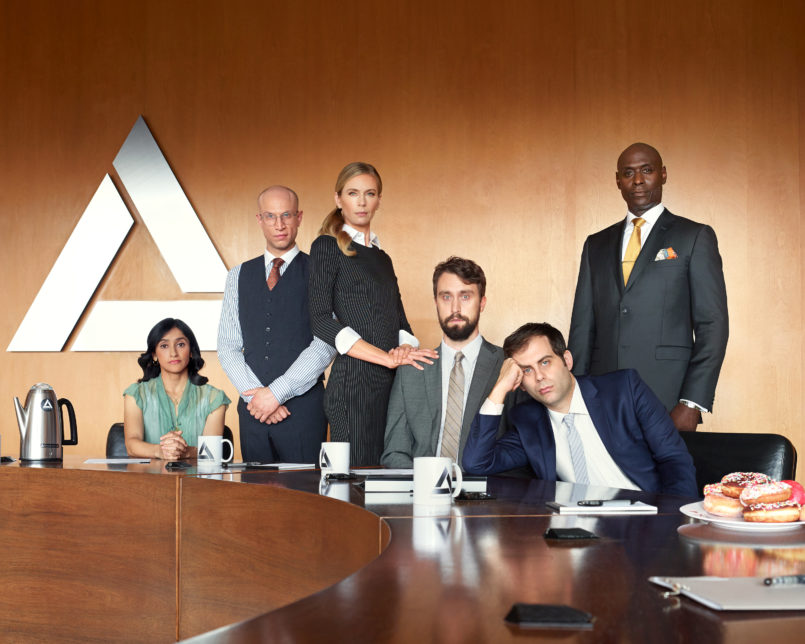
Aparna Nancherla, Adam Lustick, Anne Dudek, Matt Ingebretson, Jake Weisman, Lance Reddick / photo credit: Comedy Central
Corporate further defies TV comedy expectations by tossing out the familiar bright lights, colorful palates, and mockumentary handheld aesthetics (*Jim looks straight into the camera*), delivering a cinematic vision of a soul-crushing world that calls to mind the gloomy tones of the Coens, Being John Malkovich, and the aforementioned Fight Club. “Pat is able to bring it to life and he’s the key to that success,” Matt says. “We went in with frustration with the way most TV looks, where it’s all fitting into the same mold. It is filmmaking. And you can do whatever the fuck you want to do with the camera, and that can enhance what you’re doing.” “Filmmaking is so much more a comedic thing than a dramatic thing,” Jake says, “because of the editing of it. Comedy is in timing. You can create that timing through filmmaking, so why not?”
“Well…it is a pain in the ass,” Matt shrugs, laughing.
And so, Comedy Central has the darkest comedy on television, both visually and thematically, on its hands. Fans of behind-the-scenes drama may expect this to be the part of the story where whips are cracked and hearts broken, but, “they’ve been great to work with,” Jake says. “It’s been a symbiotic relationship.”
“The way to get a network to trust you is to always do your job and exceed their expectations,” Matt suggests. Jake nods, and can’t help but add, “I’m sure we’ll never have an experience this good again.”
“We went in with frustration with the way most TV looks, where it’s all fitting into the same mold. It is filmmaking. And you can do whatever the fuck you want to do.” — Matt Ingebretson
There is, of course, the irony of the ease with which the creators of an anti-corporate satire and Comedy Central, a Viacom company, can get along, but Jake and Matt will always be the first to tackle that paradox; they bring the subject to the table before our server can even set the menus down. Again: “Comedy Central Is Corporate.” Might as well own it.
“We are incredibly grateful and lucky to be in this position,” Matt begins, “but…our paychecks come from a giant corporation we have no influence over and are totally at the whim of. They own our lives right now.”
“We’ve been working on this show for many years, and it gives us this great sense of gratitude,” says Jake. “But every job sucks, because you have to finish it. And also, doing it well… Personally, self-hatred is a really good motivator. You have to work so hard to create something so good, and my fear of someone not even going, ‘It’s bad,’ but going, ‘It’s OK’—that drives me every second of every day.
“We’re fucking going in, banging our heads against the wall, with constant dissatisfaction with what we’re doing to try to make something better. The other irony, too, is it’s a show about how depressing being in an office is… We shoot the whole thing in that fucking office! So even though we’ve graduated out of that job, we still work in a depressing office, twelve hours a day.”
The drinks arrive, prompting a pause. “Jobs are supposed to be hard,” Matt says. “And if you want to do a good job, especially creatively, it should be hard. So we definitely—I don’t mean to sound self-aggrandizing or anything—but we definitely suffered for this job. To try to make it the best that we can.”
Considering what it took to get to this successful balance, Jake posits, “Anything you love—and try to do as a career—you’re gonna see the puppetmaster, and that’s sad. Because it’s not going to be magic anymore. You’ve got to kill yourself to make it.”
***
“We all want to kill ourselves,” Jake—the Hampton Deville employee, not the Viacom one—declares matter-of-factly in the pilot, talking to a distraught co-worker who threatens to jump off the roof. If you ever want to determine a show’s thesis statement, look to what’s being said through a megaphone.
This leads to what is perhaps both the toughest sell and the most impressive aspect of the show, in its dark intelligence and bleak world-building, where every choice from story beats and line delivery to design and music choices all contributes to a hilarious existential crisis: This is perhaps the first great TV comedy about depression.
“One of the beautiful things about comedy is you make your depression productive,” Jake concedes.
“We have this incredible chance to be alive, and yet we’re all just, ‘I’m gonna die.’ I can’t think of a funnier joke.” — Jake Weisman
As conversations around mental health finally come out into the open, Corporate’s bitter medicine and spoonful-of-sugar are one in the same. The comic exaggeration is both bold storytelling and, for all its absurdity, stunningly recognizable to anyone who’s struggled with depression, addiction, or any level of internal strife. And, again, miraculously—the result is hilarious.
“Depression is not funny…but I think it is, because it has to be,” Jake says. “If it’s not, your life is over. We have this incredible chance to be alive, and yet we’re all just, ‘I’m gonna die.’ I can’t think of a funnier joke.”
Matt confirms: “Part of it, hopefully, is being like, ‘This is what it feels like to us.’ It feels bad most of the time, but we have a sense of humor about it. And that’s the best coping mechanism we have. The heart of the show is a feeling of existential dread at all times, and seeing what’s funny and relatable about that.”
And so, the satirical conversations about the inherent ridiculousness of depression and capitalism align, be they in insomnia leading to ghost sightings around the office, where specters confirm that death is just as disappointing as life; in a poisonously witty shot where a co-worker accepts a vial of painkillers like a gift from the hand of God; in coverage of a natural disaster broadcasting on a TV with a Hampton Deville logo; in the shadowy bags under Matt and Jake’s eyes as they navigate the gray tones of the system they’ve bought into and wonder absentmindedly how they got there.
“How it feels to be in an office,” Jake summates: “I’m in a prison. And I begged to have a spot in this prison. And I need it to live. A snake eating its own tail is still getting fed.”
Our server, an hour into her shift, steps in. “Does anyone want any dessert?” FL

